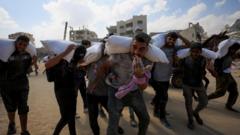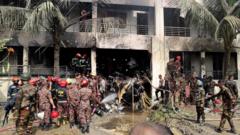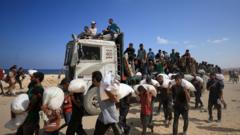Over the weekend, two tragic shootings by Israeli forces during food aid distributions underline the perilous conditions for Palestinians in Gaza, revealing deeper systemic issues and raising questions about the efficacy of current aid strategies.
Alarming Aid Distribution Incidents Raise Concerns in Gaza

Alarming Aid Distribution Incidents Raise Concerns in Gaza
Recent shootings involving Israeli soldiers highlight the dangers faced by civilians during food aid distribution in Gaza amidst ongoing conflict.
In recent days, two deadly altercations in Gaza have accentuated the extreme risks associated with aid distribution attempts, revealing the dire humanitarian crisis exacerbated by ongoing conflict. On Saturday, Israeli soldiers opened fire on Palestinians who were scrambling towards an Israel-supported food distribution site. A day later, similar scenarios unfolded as gunfire erupted among civilians rushing to receive aid from a United Nations convoy.
The incident from Saturday showcased the inherent dangers tied to the food distribution methods dictated by Israel, while the U.N. system faced scrutiny after the events on Sunday. Proponents of the Israel-backed food network successfully pointed to the violence occurring during the U.N.-led efforts, whereas advocates for U.N. aid distribution highlighted the lethal consequences of Israel’s governance approach.
According to Israeli officials, establishing distribution points outside of Hamas control aims to deter militants and looters from diverting aid supplies. However, critics argue that this strategy forces hungry individuals to traverse heavily monitored military zones, thereby increasing their exposure to potential violence.
Three overarching issues shed light on the complexities at play. First, the Israeli military's choice to deploy live ammunition in tense situations, rather than opting for non-lethal options, raises ethical concerns. Second, the critical lack of food accessibility has driven civilians to risk their lives for sustenance amid an 80-day blockade initiated earlier this year. Finally, 22 months into the ongoing conflict, Gaza faces a governance vacuum with Hamas failing to deliver essential services, leaving vast regions in chaos.
Despite the Israeli government’s military actions against Hamas leadership, critics, including voices from within Israel, stress the need for a transitional governance strategy. Prime Minister Benjamin Netanyahu insists that complete annihilation of Hamas must precede any discussions on future governance scenarios.
“The focus is on the minutiae of aid deployment,” stated Shira Efron, an authority on Gaza's aid frameworks at the Israel Policy Forum. “Yet, the root issue remains the disarray and governance collapse in Gaza. Until a comprehensive strategy is established, no resolution is attainable.”
As the humanitarian crisis deepens, the urgent need for effective governance and sustainable solutions continues to grow more pressing, even as the conflict rages on.
The incident from Saturday showcased the inherent dangers tied to the food distribution methods dictated by Israel, while the U.N. system faced scrutiny after the events on Sunday. Proponents of the Israel-backed food network successfully pointed to the violence occurring during the U.N.-led efforts, whereas advocates for U.N. aid distribution highlighted the lethal consequences of Israel’s governance approach.
According to Israeli officials, establishing distribution points outside of Hamas control aims to deter militants and looters from diverting aid supplies. However, critics argue that this strategy forces hungry individuals to traverse heavily monitored military zones, thereby increasing their exposure to potential violence.
Three overarching issues shed light on the complexities at play. First, the Israeli military's choice to deploy live ammunition in tense situations, rather than opting for non-lethal options, raises ethical concerns. Second, the critical lack of food accessibility has driven civilians to risk their lives for sustenance amid an 80-day blockade initiated earlier this year. Finally, 22 months into the ongoing conflict, Gaza faces a governance vacuum with Hamas failing to deliver essential services, leaving vast regions in chaos.
Despite the Israeli government’s military actions against Hamas leadership, critics, including voices from within Israel, stress the need for a transitional governance strategy. Prime Minister Benjamin Netanyahu insists that complete annihilation of Hamas must precede any discussions on future governance scenarios.
“The focus is on the minutiae of aid deployment,” stated Shira Efron, an authority on Gaza's aid frameworks at the Israel Policy Forum. “Yet, the root issue remains the disarray and governance collapse in Gaza. Until a comprehensive strategy is established, no resolution is attainable.”
As the humanitarian crisis deepens, the urgent need for effective governance and sustainable solutions continues to grow more pressing, even as the conflict rages on.





















